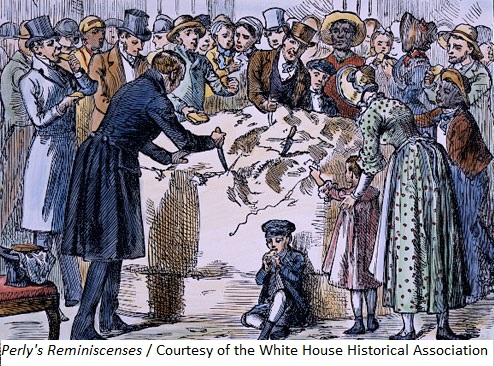Democratic Innovations: Bridging the Gap Between Citizens and Policymakers

In 1837, President Andrew Jackson invited the public into the White House foyer to discuss issues of the day with staff while enjoying hunks of a 1,400-pound block of cheese that had been delivered as a gift from New York State dairy farmers and aged there for two years.
Inspired by this gesture — as recounted and adopted for a fictional president by writers of the TV show “The West Wing” — President Barrack Obama’s administration held two Big Block of Cheese Day events, answering questions from the public on social media.
Of course, citizens do not necessarily need to literally or symbolically consume coagulated, compressed, curds of milk to gain access to their elected officials. Americans have long sent letters to their representatives and executive branch officials. More recently, they send emails and place phone calls to register their complaints, ask for help, and signal their support for pending legislation.
But what makes for a successful citizen-government communication? And — particularly in our current and rapidly evolving technological environment — how can advocacy groups effectively tailor their campaigns to achieve desired responses from policymakers?
At the Institution for Social and Policy Studies, these are the types of questions we are exploring through our new Democratic Innovations program, designed to identify and test new ideas for improving the quality of democratic representation and governance.
Last year, Kaylyn Jackson Schiff, an assistant professor of political science at Purdue University, visited Yale as a resident ISPS Democratic Innovations fellow. One of her projects, conducted with Justin de Benedictis-Kessner, assistant professor in Harvard University’s John F. Kennedy School of Government, measured the impact of transportation advocacy campaigns on state legislators in six states.
In collaboration with the League of American Bicyclists, the researchers found that messages in which constituents shared personal stories relating to proposed legislation were the most memorable for representatives and that messages employing relevant facts increased officials’ support for the targeted bill.
In addition, messages with factual information generated the greatest increase in state legislators’ support for a proposal to create incentives for people to purchase e-bikes, while the “personal impact stories” were most effective in increasing support for local municipalities to set safer speed limits.
Schiff speculated that the emotional nature of how speeding can result in serious injury or death increased the effectiveness of the personal stories seeking to affect speed limits while policies to promote the use of e-bikes seek to address perhaps less emotional outcomes of reducing traffic and addressing climate change. They are also a newer, less-well-known product, and legislators could have been more open to learning facts about how they could help people reach their jobs and address equity issues, she said.
“One of the questions that really motivates me as a political scientist who studies public policies is: When are the issues that people care about translated into government actions?” Schiff said. “Advocacy campaigns are a huge area for amplifying peoples’ voices in our political system. It’s an important channel for democratic input in the policymaking process.”
Overall, 65% of state legislative offices studied in Massachusetts, Maine, Michigan, Minnesota, Ohio, and Washington reported receiving constituent personal impact story messages on the campaign topic, compared with 25% of offices in a control group that the researchers did not contact. Ninety-one percent of legislators receiving fact-based messages from the campaign said they would support the proposed legislation, compared with 71% of a control group.
The researchers did not detect an impact of the campaign on legislative votes on the two topics, possibly because the measures did not make it to a vote this past session, the policies were tucked into much larger omnibus bills covering many issues, or partisan concerns took precedence over constituent feedback, the researchers said.
Prior to pursuing publication of the study, Schiff plans to continue tracking the legislation and collecting additional materials to support the findings, such as the legislators’ constituent newsletters, social media mentions, and other outreach efforts with potential data about the two transportation issues. She said the experiment offered helpful lessons for how to secure the cooperation of legislators for future studies, noting that they are more likely to pay attention to contacts from constituents than researchers and student research assistants.
In addition, before returning to Purdue at the end of the summer, Schiff conducted a survey experiment to determine how artificial intelligence-based large language models such as ChatGPT might affect communication with elected officials.
“For a while now, technology has been revolutionizing contact with officials by making access easier and reducing the time to produce a message,” she said. “You don’t have to go to their office or mail a letter. And now with apps like ChatGPT, the content of those messages can be more readily produced. ChatGPT can even provide compelling details about policies to make constituents’ messages sound sophisticated.”
Schiff is exploring whether people would support the use of such tools for individuals and advocacy groups to communicate with government officials. And whether the proliferation of such tactics might lead representatives to doubt they are receiving authentic messages from real humans.
“One common theme from these two different studies is the benefit of human connectedness,” she said. “Personal stories made an impact because public servants tend to care about their constituents. And in a rapidly automating world, there is value in maintaining the human element.”
Schiff said we need to explore ways to make these personal government-citizen interactions more approachable, accessible, and interesting for citizens.
“People need to be motivated and feel they matter in politics,” she said. “Because they do.”
Even without a huge hunk of cheese.